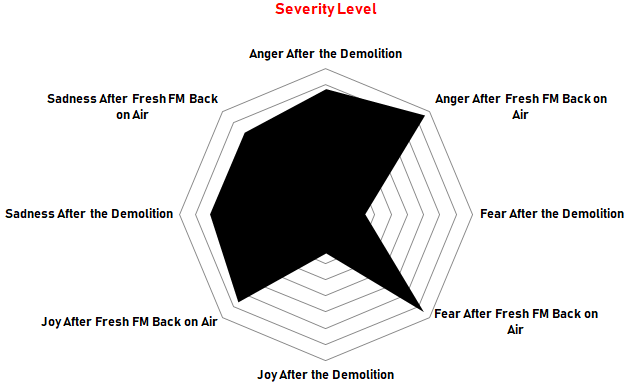The Art of Creating Complicated Sympathy and the Challenge of Managing Government-Citizens Crisis in Nigeria
Nothing has shaped government-citizens relationships in the
last two decades more than social media. In developed and developing countries,
Facebook, Twitter among others, have helped and still assisting citizens to
express their grievances on poor governance and support of exemplary leaders. Citizens
are also more inclined to connect and interact on issues that affect prominent
citizens and the vulnerable.
These are the pointers
to the fact that managing issues and crises being fuelled in the virtual sphere
requires specific strategies and techniques. Such remedies must be tailored to
emerging emotions and dispositions of the actors and non-actors. Infoprations understands this after modelling
the recent demolition of part of Fresh FM Radio Station premises owned by Yinka
Ayefele, a popular Gospel Musician in Nigeria. He chose music as
his profession after a ghastly motor accident on December 12, 1997, which
damaged his spinal cord. In order to get the required funds for surgical
operations, he released a music album to raise the funds.
Public
Interest in the Demolition
Being a prominent and physically
challenge citizen, the public interest in the demolition was high. Analysis
indicates that the two actors –Yinka Ayefele and Governor Abiola Ajimobi were
mostly considered for the understanding of the reasons for the demolition. Statistics
shows that the public interest in knowing demolition in connection with the
musician was 52.8% while Governor Ajimobi was 53.5%.
The analysis further
indicates that having more knowledge about demotion was premised on
understanding Yinka Ayefele, Ayefele music, Yinka Ayefele Music House, Fresh
FM, Oyo State and Abiola Ajimobi searches by 6.5%. Demotion as a concept was
also found to be understood by Abiola Ajimobi, Yinka Ayefele and Fresh FM
searches by 38.1%.
Infoprations
equally discovered that demolition, demolished, Fresh FM, Yinka Ayefele and
demolishing enhanced searching for Yinka Ayefele by 92.2% and Governor Abiola
Ajimobi by 97.4%. These insights
indicate the people in the 43 countries are considering Yinka Ayefele and
Governor Abiola Ajimobi as frames through which they could understand
demolition from Nigerian context.
Complicated Sympathy as a Challenge to Sustainable Crisis Management
As expected, public knowledge of demotion,
demolition and Yinka Ayefele’s previous ordeals invokes different emotions
which connote sympathy. Anger, fear, joy and sadness were found in the people’s
reactions to the demolition and after the radio station begun operations. While
expressing their feelings, calamity, sad, evil, anger,
mistrust, hatred, condemn, callous, bastard, guilty, compensation, gullible,
vendetta, senseless, happy, preventing, bad, destroy, regret, heartless,
miserable, blame, wrong, barbaric, benign, interest, wealth, abominable,
irrational, tyranny among others were discovered dominant words used to frame
the crisis.
These words are positive and negative. The complexity of
understanding these words is hinged on the fact that people who expressed their
feelings combined the two types, while exhibiting anger, fear, joy and sadness,
indicating highly uncertain nature of the people and a significant threat to
crisis managers.
The analysis further reveals that Nigerians could not control
their anger after the demolition. Anger became tense after the Fresh FM Radio
begun operations. Their level of fear was low compared to what they exhibited after
the station started broadcasting of programmes and news. The sadness level was
the same for the post-demolition and after the station kicked off operations. Understandably,
Nigerians were happier when the station started operations again than
post-demolition period.
These insights indicate that in a government-citizen face-off
it would be difficult for anger, fear and sadness to dissipate among
stakeholders because negative words would always be moderators as long as
people relaying on negative messages to understand the actors. In crises like
this, crisis managers should employ words and engage in actions capable of
reducing anger, fear and sadness, and the possibility of the negative
communication dynamic in the virtual sphere.

Comments
Post a Comment